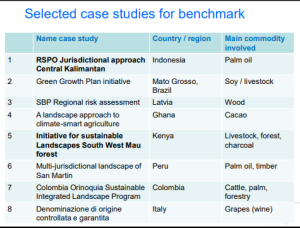This study assesses regional and landscape-based to measure and document the sustainability of bioenergy and biomaterials supply chains, compared to traditional governance theorizations.
A landscape approach is a multi-sector conceptual framework related to land management and governance: it represents a multi-actor system being characterised by multi-level interaction, that is, a number of competing stakeholders interact together to fulfil different objectives.
Starting from this theory, the research aims at providing a better understanding of regional governance approaches to assess the sustainability of bioenergy and biomaterial supply chains in different scales and geographical settings.
A key step of the entire methodology is benchmarking of selected regional governance approaches. The case studies taken into account are the most diverse, in terms of geographical area and main commodity involved.

First results from RSPO Jurisdictional approach in Central Kalimantan (Indonesia) and Initiative for sustainable Landscapes in South West Mau Forest (Kenya) denote that there are elements in each initiative for improving the sustainability (especially related to legality and off-farm issues).
While in the Kalimantan case there is an actual mapping of the multi-stakeholder collaboration as well as a certification to stimulate them but monitoring system for deforestation and land tenure is still expected to be improved, in Mon Mau we found a strong stakeholder engagement but not a clear system of certification as a whole.
By addressing these two case studies out of eight, it seems evident that:
- certification alone is not able to tackle all of the issues;
- the bioenergy sector needs to align with land-uses and those actors (institutional or not) capable of catalysing change within the region.
The analysis of these two regional approaches furnished some useful elements to perfectionate the model approach: next steps will be those of finishing benchmarking by adding the rest of the case studies as well as conducting stakeholders’ interviews and field visits to get first-hand material.
This post is based on the presentation Novel Regional and Landscape-Based Approaches: Their Effectiveness and Legitimacy to Govern the Sustainability of Bioenergy and Biomaterials Supply Chains by J. van Dam and R. Diaz-Chavez, presented at the 26th European Biomass Conference & Exhibition. The full presentation is available open access in the official proceedings of the conference.


